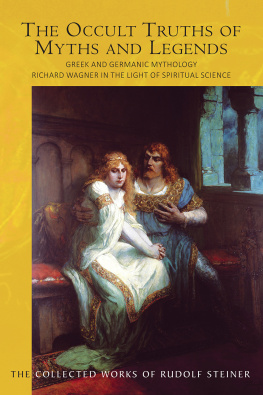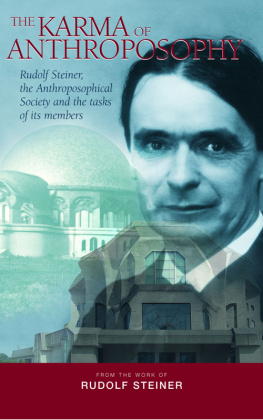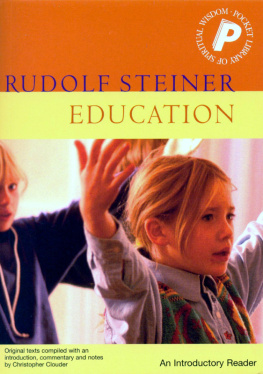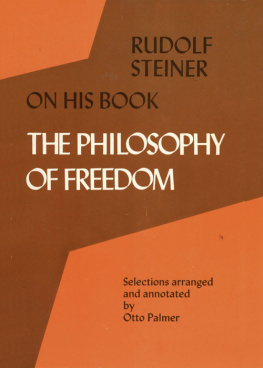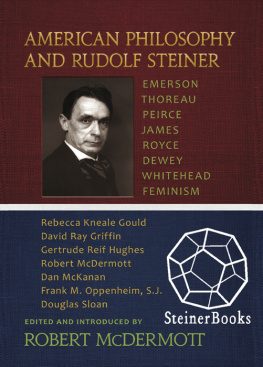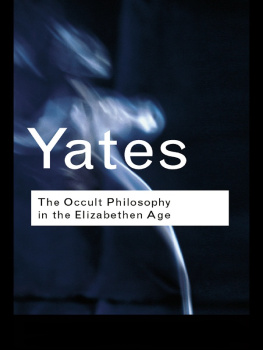Dr Rudolf Steiner - Occult Science: An Outline
Here you can read online Dr Rudolf Steiner - Occult Science: An Outline full text of the book (entire story) in english for free. Download pdf and epub, get meaning, cover and reviews about this ebook. year: 2005, publisher: Rudolf Steiner Press, genre: Science fiction / Religion. Description of the work, (preface) as well as reviews are available. Best literature library LitArk.com created for fans of good reading and offers a wide selection of genres:
Romance novel
Science fiction
Adventure
Detective
Science
History
Home and family
Prose
Art
Politics
Computer
Non-fiction
Religion
Business
Children
Humor
Choose a favorite category and find really read worthwhile books. Enjoy immersion in the world of imagination, feel the emotions of the characters or learn something new for yourself, make an fascinating discovery.

- Book:Occult Science: An Outline
- Author:
- Publisher:Rudolf Steiner Press
- Genre:
- Year:2005
- Rating:5 / 5
- Favourites:Add to favourites
- Your mark:
- 100
- 1
- 2
- 3
- 4
- 5
Occult Science: An Outline: summary, description and annotation
We offer to read an annotation, description, summary or preface (depends on what the author of the book "Occult Science: An Outline" wrote himself). If you haven't found the necessary information about the book — write in the comments, we will try to find it.
Occult Science: An Outline — read online for free the complete book (whole text) full work
Below is the text of the book, divided by pages. System saving the place of the last page read, allows you to conveniently read the book "Occult Science: An Outline" online for free, without having to search again every time where you left off. Put a bookmark, and you can go to the page where you finished reading at any time.
Font size:
Interval:
Bookmark:
We may also say, it could only live the life of a plant in the physical body.
Explanations such as those given in this book regarding the faculty of memory may very easily be misunderstood. For one who observes external events only would not at first sight notice the difference between what happens in the animal, or even in the plant, when something appears in them resembling memory, and what is here characterized as actual recollection in man. Of course, when an animal has performed an action for a third or fourth time it may perform it in such a way that the outer process gives the impression that memory and the training associated with it are present. Nay, we may even extend our conception of memory or of recollection as far as some naturalists and their disciples, when they point out that the chicken begins to pick up grain as soon as it comes out of the shell; that it even knows the proper movements of head and body for gaining its end. It could not have learned this in the eggshell; hence it must have done so through the thousands and thousands of creatures from which it is descended (so says Hering, for example). We may call the phenomenon before us something resembling memory, but we shall never arrive at a real comprehension of human nature if we do not take into account that every distinctive element which shows itself in the human being as an inner process, as an actual perception of earlier experiences at a later date, is not merely the working of earlier conditions in later ones. In this book it is this perception of what is past that is called memory, not alone the reappearance (even though transformed) of what once existed, in a later form. Were we to use the word memory for the corresponding processes in the vegetable and animal kingdoms, we should be required to use a different word in speaking of man. In the description given here the important thing is not the particular word used, but rather that in attempting to understand human beings this distinction should be recognized. Just as little do the apparently very intelligent actions of animals have any relation to what is here called memory.
The term Verstandesseele is sometimes translated by rational soul. From a certain point of view one might prefer the term intellectual soul, because it expresses better the activity of the soul than does rational soul. In the latter one thinks of the knowledge about a perception; in intellectuality, one thinks of the actual possibility of forming this knowledge through inward activity. In German the expression emotional soul only coincides as it should with the second member of the soul when the inward activity is kept in view.
No hard and fast line can be drawn between the changes which are accomplished in the astral body through the activity of the ego and those taking place in the etheric body. The one merges into the other. When a man learns something, and thereby gains a certain capacity for judgment, a change takes place in his astral body; but when this judgment changes his natural disposition, so that he habituates himself to feel differently, in consequence of his learning, from what he did before, this means a change in his etheric body. Everything that becomes so much a man's own that he can always recall it, is based on the transformation of the etheric body. That which little by little becomes an abiding possession of the memory has its foundation in the transmission to the etheric body of the work of the astral body.
As a matter of fact, it is always very profitable for any one who is taking up the study of occult science to acquaint himself with the statements of those who regard this science as merely fanciful. Such statements cannot be so easily branded as due to partiality on the part of the observer. Let occultists learn as much as possible from those who regard their efforts as nonsense. They need not be disturbed if in this respect their love is not reciprocated. Occult observation assuredly does not require such things for the verification of its results, nor are these allusions intended as proofs but as illustrations.
In current theosophical literature, the condition of the ego from death to the end of purification is called Kamaloca.
The assertion that a man's personal talents, if governed purely by the law of heredity, must show themselves at the beginning of a line of descent, not at its end, might of course easily be misunderstood. It might be said, indeed, that they could not show themselves then, for they must first be developed. But this is no objection; for if we wish to prove that something has been inherited from an ancestor, we must show how that which was there formerly is repeated in a descendant. Now if it were demonstrated that something existed at the beginning of a genealogical line which reappeared in its further course, we might speak of heredity. We cannot do so when something appears at the end of it which was not there before. The reversal of the above proposition is only to show that the belief in heredity is impossible.
In different chapters of this book it has been shown how the world of humanity, and man himself, pass, in their progressive evolution, through conditions which have been named Saturn, Sun, Moon, Earth, Jupiter, Venus, and Vulcan. The relationship has also been indicated in which human evolution stands with regard to the celestial bodies which exist besides the earth and which are called saturn, jupiter, mars, and so on. These latter planets are also passing through their evolution in the natural way. At the present period they have reached such a stage that their physical portions are seen as those bodies which physical astronomy calls saturn, jupiter, mars, and so forth. Now when the saturn of the present day is observed by occultism it is seen to be, in a certain sense, a reincarnation of the old Saturn. It has come into existence because of the presence of certain beings, who before the separation of the sun from the earth were unable, like the others, to leave with the sun. The reason of this was that they had gained so many qualities which are suitable for a saturn existence, that their place could not be where the qualities of the sun were specially unfolded. The present jupiter, however, arose in consequence of the presence of beings possessed of qualities which can only be matured on the future jupiter of the whole evolution. A dwelling place appeared for them on which they can already begin in anticipation of this later evolution. In the same way mars is a planetary body on which dwell beings whose lunar evolution was such that further progress on the earth could bring them nothing. Mars is a reincarnation of the old Moon at a higher stage. The present mercury is the dwelling place of beings who are beyond the evolution of the earth; but this is just because they have developed certain qualities in a higher way than is possible on the earth itself. The present venus is a prophetic anticipation of the future Venus condition of a similar kind. It is consequently justifiable to give to the conditions preceding and following the Earth the names of their corresponding representatives in the universe.
Therefore it is perhaps scarcely necessary to remark that what has been described above could never actually happen. A contemporary man, as he is, could not have approached ancient Saturn as a spectator. The account was given merely for the sake of illustration.
In Christian spiritual science they bear the name of Kyriotetes, that is, Dominions.
In Christian esoteric science they are called Thrones.
The Christian Dynamis, or Powers.
The Christian Exusiai, or Authorities.
The Christian Archai, or Principalities.
The Christian Archangeloi, or Archangels.
The Christian Seraphim.
The Christian Angeloi, or Angels.
The Christian Cherubim.
The gas appears to clairvoyant consciousness through the effect of light which emanates from it. We might therefore speak also of light forms, which are apparent to spiritual vision.
Font size:
Interval:
Bookmark:
Similar books «Occult Science: An Outline»
Look at similar books to Occult Science: An Outline. We have selected literature similar in name and meaning in the hope of providing readers with more options to find new, interesting, not yet read works.
Discussion, reviews of the book Occult Science: An Outline and just readers' own opinions. Leave your comments, write what you think about the work, its meaning or the main characters. Specify what exactly you liked and what you didn't like, and why you think so.

